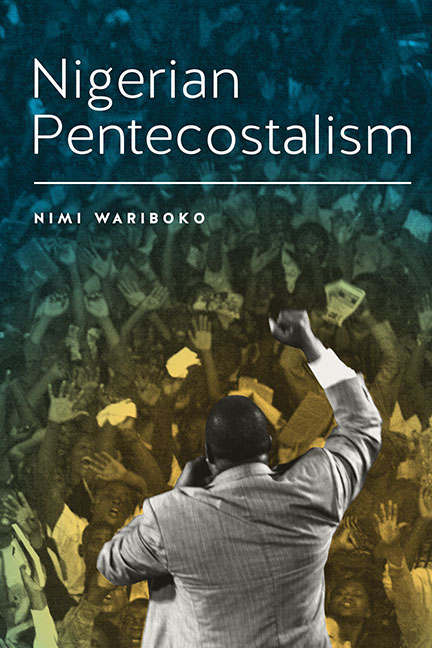Book contents
- Frontmatter
- Dedication
- Contents
- Foreword
- Preface
- Acknowledgments
- Introduction
- Part 1 Origins and Spirituality of Nigerian Pentecostalism
- 1 Sources of Nigerian Pentecostalism
- 2 The Spell of the Invisible
- 3 Excremental Visions in Postcolonial Pentecostalism
- 4 Desire and Disgust: Ways of Being for God
- 5 The Pentecostal Self: From Body to Body Politic
- Part 2 Ethical Vision of Nigerian Pentecostal Spirituality
- Notes
- Bibliography
- Index
5 - The Pentecostal Self: From Body to Body Politic
from Part 1 - Origins and Spirituality of Nigerian Pentecostalism
Published online by Cambridge University Press: 15 March 2018
- Frontmatter
- Dedication
- Contents
- Foreword
- Preface
- Acknowledgments
- Introduction
- Part 1 Origins and Spirituality of Nigerian Pentecostalism
- 1 Sources of Nigerian Pentecostalism
- 2 The Spell of the Invisible
- 3 Excremental Visions in Postcolonial Pentecostalism
- 4 Desire and Disgust: Ways of Being for God
- 5 The Pentecostal Self: From Body to Body Politic
- Part 2 Ethical Vision of Nigerian Pentecostal Spirituality
- Notes
- Bibliography
- Index
Summary
The body is the “perhaps,” the peut-être of the body politic. It is the chance that keeps the circle of the body politic ex-posed to an outside. It is the aleatory that irrupts and disrupts whole, being, être from within. So the body must be “washed” and watched so it can supply “the dangerous perhaps of the possibility of the impossible that solicits” the body politic from afar.
—John D. Caputo, Weakness of GodIntroduction
In this chapter I will investigate the Pentecostal conception of the human body, showing how such a view informs our thinking on the body politic. How does the Nigerian Pentecostal view on the human body allow for movement of thought and action from the individual level to the collective, whether political or spiritual? Some of the other questions I will consider are these: How is lived experience of the Pentecostal body linked with the body politic? How does the way a society treats, displays, interprets, and understands the limitations of the body, along with its attempts to transcend the body's finitude, affect, ground, or influence the political? How does a society's understanding of human bodies interface with its understanding of the political, the way the political works, and how persons approach the political either to acquire the power of domination or to transform it for the common good? In short, how do we go from body to the body politic and to the theological?
The move to examine the body politic points to a guiding theoretical insight of this work that takes “the creation of specific kinds of subjects and bodies to be fundamental to the making of a body politic.” This turn from body to body politic, from the microsites of individual bodies to the macropolitics of the social body makes theoretically explicit a theme that informs all of this book: Pentecostal spirituality is a way of acting on bodies, of effecting natality, enacting actions, initiating something new in communities and also of normalizing them. Besides, the moral predicates and practices by which the subject maintains his or her Pentecostal identity and the “interior frontiers” of the social body are actuated by disciplinary normalization and protocols of the body (politic). The disciplines of the body are ultimately “enveloped” in the macrosurveillance of the body politic.
- Type
- Chapter
- Information
- Nigerian Pentecostalism , pp. 113 - 142Publisher: Boydell & BrewerPrint publication year: 2014

